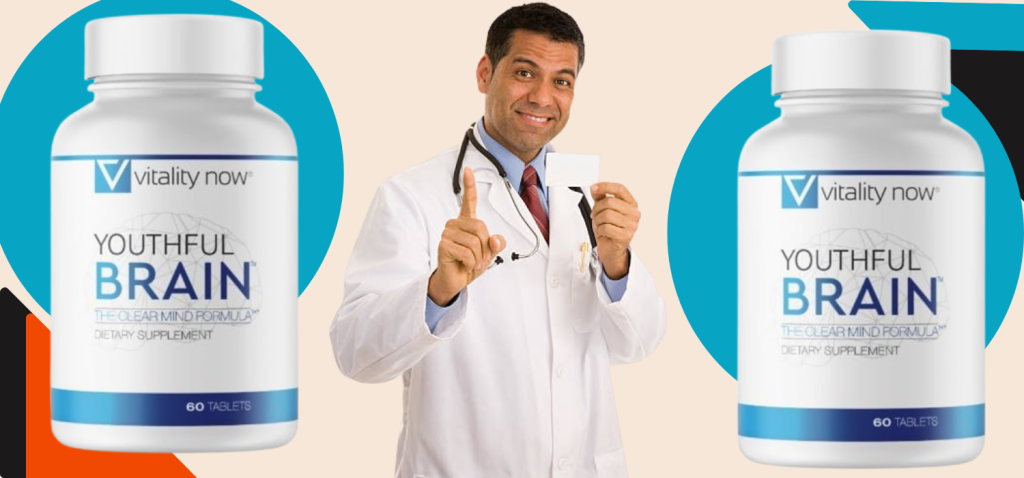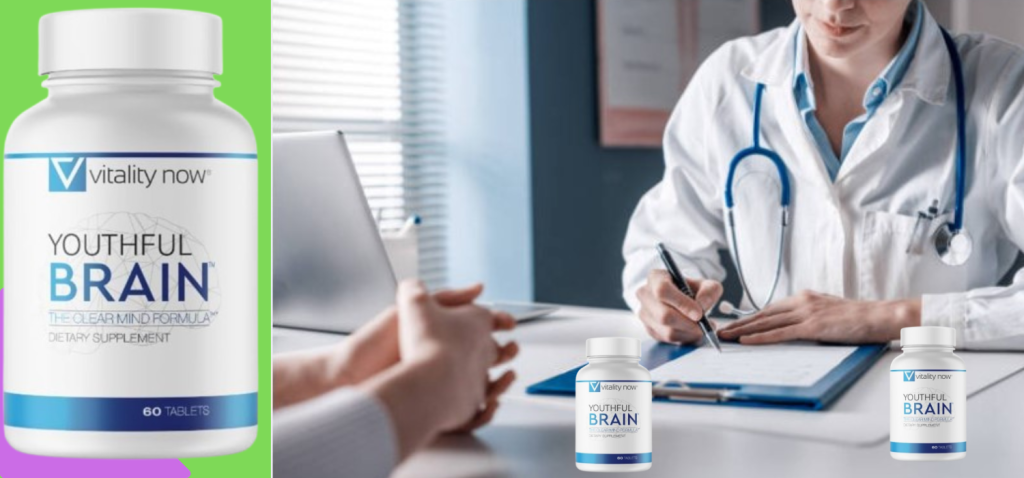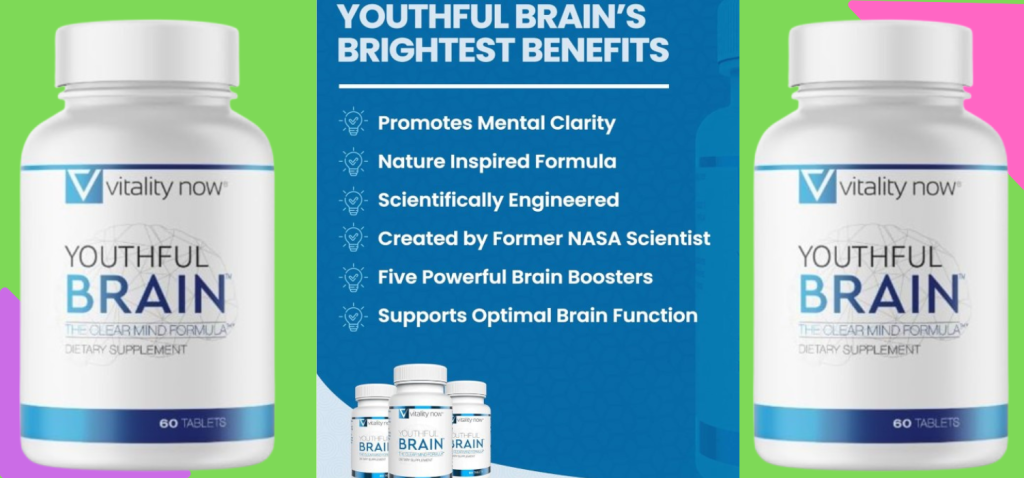Youthful Brain
The human brain is the usually powerful and complex structure responsible for human life and organic functions, including memory, thinking, movement, and feelings. Some cognitive skills are known to decrease as a person ages. Still, for decades, numerous scholars and practitioners have focused on the concept of maintaining or even attaining pre-onset cerebral performance. This article will also examine the science behind a young brain and the procedures for preserving its function and discuss how changes in one’s lifestyle can help reveal the secrets to remaining mentally sharp for a whole lifetime.Youthful Brain

The Science of Aging and the Brain
To achieve this, it is particularly important to learn more about the mechanisms of ageing on the cerebral structure. At this time, for example, neurones shrink and the space between them increases, blood vessels become narrowed, and the levels of certain chemicals in the brain are altered. Ultimately, damage may occur to neurones, the brain cells responsible for information transmission. In addition, the space between the neurones, called a synapse, may weaken or disappear altogether. These changes also increase an individual’s vulnerability to age-related cognitive decline, or reduced mental capability, in terms of memory, speed of thought, and ability to solve complex problems.Youthful Brain
But ageing does not always equal mental decline, as many people assume. Although the brain’s ability to reason and decide can be impaired due to ageing, it is found that the cortex prone to ageing is not greatly reduced as compared to the hippocampus, which is involved in memory. The best thing to do to maintain a young brain is to protect and optimize these regions and foster neuroplasticity—what’s known as the brain’s ability to rewire itself.Youthful Brain

Neuroplasticity: The Brain’s Secret Weapon
The newest phenomenon in neurospice is that the brain is able to reorganize itself by forming new neural connections, thus resulting in what we call neuroplasticity. Neuroplasticity occurs when the brain adjusts its functioning depending on new experiences and learning or other changes in education. That is how the possession of the brain is adapted to new facts, situations, and challenges. For example, you transform your brain when ID-ing a new hobby or when learning a new language.
Neuroplasticity is an important process in the maintenance of youth’s brain. Even among elderly people, the brain can establish new links with active neurones as well as strengthen pre-existing connections. Flexibility as a process can go a long way in undoing some of the effects of aging on the brain and is vital to safeguarding cognitive ability. It is suggested that increasing the brain workload is still a beneficial factor in the framework of neuroplasticity, which may retard the onset of age-related cognitive impairment and even lead to the improvement of actual cognitive performance.Youthful Brain

Key Strategies for a Youthful Brain
1. Exercise: The Miracle of Brain Boosting
Physical training is not only beneficial for the physical aspect but for the brain as well. This region of the brain, which is associated with memory and learning, has been shown that it occurs in size in response to aerobic exercise like walking, jogging, cycling, or swimming. Endorphins are substances produced in the body that help maintain the healthy functioning of neurones; BDNF, for instance, is released much easier during a workout.
Exercise enhances the supply of blood to the brain, for the provision of nutrients and oxygen that stimulate the brain. Depression and increased likelihood of dementia and cognitive deterioration have been found to be reduced by engaging in regular exercises. Exercise is beneficial for the brain because it helps to enhance the structure of the brain, its functioning, and mood and reduces stress, both of which help in paying attention and being mentally perceptive.Youthful Brain
2. Brain-Training Exercises: Test Your Intelligence
Poor cognitive health can be affected by activities that demand intelligence. Television is a simple example of mental inactivity, as well as other addictive activities such as playing computer games, while puzzles, reading books, new skills, and playing an instrument are some of the brain activities that stimulate neuroplasticity. As the balance of neuro-pathways changes, these exercises may improve memory, problem-solving, and cognitive function in general.
A survey undertaken showed that individuals who engage in mentally stimulating activities over their lifetime enjoy better brain capacity as they grow old. Easy activities like memory games, chess, and crossword puzzles seem to affect the brain most as far as brain health is concerned. The thing here is to incorporate these exercises into your day and always challenge yourself by accepting more complex tasks.
3. Nutrition: Supplying the Brain with the Fuel He Needs for Maximum Performance
A youthful brain is fed mostly by a healthy diet that’s properly balanced, as it has been illustrated in the article. The brain must receive various nutrients in order to function effectively; these are proteins, vitamins, minerals, and fats in general. In other words, nutrient intake protects against inflammation and oxidative stress, which are linked with cognitive decline.Youthful Brain

Among the particular nutrients that promote brain health are:
• Omega-3 fatty acids: Essential for proper brain functioning and, possibly, delaying the development of Alzheimer’s disease, omega-3 fatty acids can be obtained from walnuts, flaxseeds, and fatty fish like salmon.
• Antioxidants: Fruits and vegetables help protect the brain from oxidative stress, and these foods that are well equipped with antioxidants include oranges, spinach, and blueberries.
• B vitamins: These are folates and B6 and B12, and taking foods from these groups can help one avoid memory loss.
• Vitamin D: It should be noted that getting optimal amounts of vitamin D through sunlight or, if necessary, through supplements is important, as deficiencies are linked with cognitive decline.
Also, as much as the body needs water to carry out its normal duties, a lack of it, or dehydration, could reduce the brain’s ability to concentrate
4. Sleep: The Time for Brain Repair
Sleep is vital for one’s overall health and well-being, and I specifically need to ensure that my brain ages slower than my body. The human body cleanses itself of toxins, rewires neural connections, and cements new knowledge while the occupants, the mind, sleep. Sleep deprivation retards the ability to remember things, control emotions, and even impacts thought process and decision-making.
Adults should attempt to sleep seven to nine hours per night. Ways to get better sleep include creating a sleeping routine, avoiding coffee just before bedtime, and ensuring the bedroom is conducive to sleep. Taking breaks for your brain is important because, otherwise, a lack of sleep or sleep of poor quality over time is linked with cognitive decline.

5. Social Interaction: The Place of Relationships
Simply put, one’s brain is not healthy if they are socially isolated. As it has been proved that notifications foster objective along with social activity, as well as having interactions with meaningful others would delay the cognitive loss together with improve mental health. Cohort results reveal that social contacts are significant for maintaining the emotional state, reducing stress, and encouraging the activity of brain cells, which is important for youthful brains.
Moreover, social relations help in combating what may hinder the mind—loneliness and isolation. Thus, you may stay physically and socially connected, volunteer, participate in group practices, or just spend time with friends or family to keep your brain linked.
Conclusion: Youthful Brain
BRAIN AGEING REQUIRES A COMPREHENSIVE PLAN BASED ON MENTAL EXERCISES, PHYSICAL MOVEMENT, DIET, NO STRESS, AND INTERACTION. While ageing is indeed inevitable, these methods can enhance neuroplasticity and prevent and, in some cases, undo facets of ageing in the brain. Thus, if you take care of you now, you can help your brain to remain healthy, powerful, and full of life for many years ahead.
Thus, people ceasing to be young only in their head is as a result of taking personal responsibility to care for one’s brain and challenge the brain through exercise, both physical and mental, together with making proper lifestyle decisions for BRAIN-HEALTH. Tap into a powerful young mind that will serve you at an elderly person by beginning the process today.